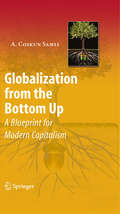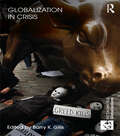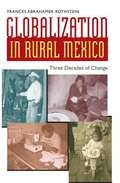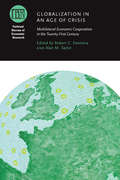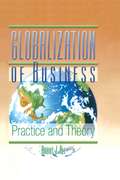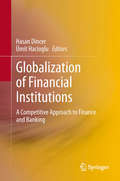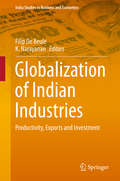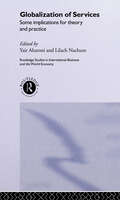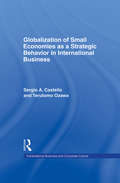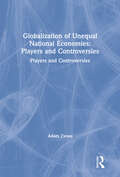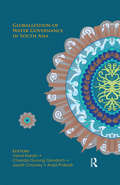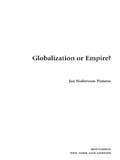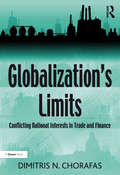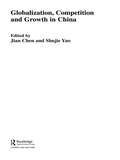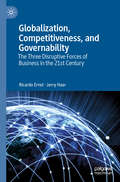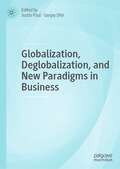- Table View
- List View
Globalization from the Bottom Up
by A. Coskun SamliTakes a proactive approach to addressing big issues of world poverty, economic development, and the impact of globalization -- with recommendations for business leaders, policymakers, and concerned citizens around the world Samli offers an alternative model, a philosophy and practice of "social capitalism" that is grounded in a bottom-up approach to wealth creation, while acknowledging that power will continue to be concentrated at the top level of the pyramid
Globalization in Crisis (ISSN #1)
by Barry K. GillsThis book analyses the present global financial and economic crisis, the most severe in nearly a century, and a wider set of multiple and converging crises with aspects and repercussions that go well beyond the current economic climate.Written by some of the world’s leading international scholars in the field of Globalization studies and related disciplines, this important collection addresses numerous key aspects of the relationship between Globalization and global crises, past, present, and future. It sheds new light and understanding on the concept and theory of Globalization and of ‘crisis’. The authors explore such issues as global finance and financial regulation, neoliberal ideology and policy, the ‘crisis of globalization’, the decline of Western hegemony, world systemic crisis, the moral crisis of ‘Western capitalism’, environmental and climate change crises, world order, hyper-violence and the international system, a crisis of the ‘global modern’ and a global civilisational and hostpric crisis, the rise of the global South, the historical dialectics of capital and social responses to crisis, the future of capitalism and the prospects for transformative alternatives. This book was published as a special issue of Globalizations.
Globalization in Rural Mexico: Three Decades of Change
by Frances Abrahamer RothsteinWhen the ever-intensifying global marketplace "modernizes" rural communities, who stands to gain? Can local residents most impacted by changes to their social fabric ever recover or even identify what has been lost?<P><P>Frances Abrahamer Rothstein uses thirty years of sustained anthropological fieldwork in the rural Mexican community of San Cosme Mazatecochco to showcase globalization's complexities and contradictions. <P> Rothstein's lucid work chronicles the changes in production, consumption, and social relations during three distinct periods: the Mexican "miracle," when economic development fueled mobility for a large segment of the population, including San Cosme's worker-peasants; the lost decade of the 1980s, when much of what had been gained was lost; and the recent period of trade liberalization and globalization, considered by many in Mexico and beyond as a panacea and a disaster at the same time.
Globalization in an Age of Crisis: Multilateral Economic Cooperation in the Twenty-First Century (National Bureau of Economic Research Conference Report)
by Robert C. Feenstra Alan M. TaylorAlong with its painful economic costs, the financial crisis of 2008 raised concerns over the future of international policy making. As in recessions past, new policy initiatives emerged, approaches that placed greater importance on protecting national interests than promoting international economic cooperation. Whether in fiscal or monetary policies, the control of currencies and capital flows, the regulation of finance, or the implementation of protectionist policies and barriers to trade, there has been an almost worldwide trend toward the prioritizing of national economic security. But what are the underlying economic causes of this trend, and what can economic research reveal about the possible consequences?Prompted by these questions, Robert C. Feenstra and Alan M. Taylor have brought together top researchers with policy makers and practitioners whose contributions consider the ways in which the global economic order might address the challenges of globalization that have arisen over the last two decades and that have been intensified by the recent crisis. Chapters in this volume consider the critical linkages between issues, including exchange rates, global imbalances, and financial regulation, and plumb the political and economic outcomes of past policies for what they might tell us about the future of the global economic cooperation.
Globalization in the Age of Trump
by Pankaj GhemawatBusiness leaders are scrambling to adjust to a world few imagined possible just a year ago. The myth of a borderless world has come crashing down. Traditional pillars of open markets--the United States and the UK--are wobbling, and China is positioning itself as globalization's staunchest defender. Countries throughout North America and Europe have experienced waves of anti-globalization sentiment. In the face of such uncertainty, leaders of multinationals wonder whether they should retreat, change strategy, or stay the course. In making that decision, they need to understand two things. First, the world is less globalized than even experienced executives realize. Second, history tells us that even in the face of a trade war, international trade and investment would still be too large for strategists to ignore. Today's turmoil calls not for a mass retreat from globalization but for a more subtle reworking of multinationals' strategies. This article examines common misperceptions about what is--and isn't--changing about globalization and offers guidelines to help leaders decide where and how to compete in a complex world.
Globalization of Business: Practice and Theory
by Erdener Kaynak Abbas J AliCreate a successful strategy for competition in the global marketplace!Globalization of Business: Practice and Theory will give executives and business students a current, in-depth look at ways to become globally competitive in today's complex market. This essential guide offers you insight into issues every global businessperson needs to
Globalization of CEMEX
by Pankaj Ghemawat Jamie L. MatthewsCEMEX is a Mexican company that has become a major international competitor in cement while maintaining a higher level of profitability than other, longer-established majors. CEMEX's superior profitability supplies a basis for discussing the sources of superior performance in a global context. In addition, the wide array of benefits that CEMEX derives from its operations in different countries broadens conventional notions of why firms globalize.
Globalization of Consumer Markets: Structures and Strategies
by Erdener Kaynak Salah HassanThe concepts, strategic frameworks, and cases in Globalization of Consumer Markets provide managers of global firms with new ideas for growth and keep them current with state-of-the-art global marketing strategies and management tools. With an increased understanding of the structure of today’s consumer markets, readers will find they have the key to success and survival in the global marketplace.The contributing authors present managerially oriented chapters, each of which is based on research or practical experience. These are designed to advance the reader’s knowledge of the globalizing consumer market. Focused around structure--how consumer markets on a global scale are being shaped--and strategy--successful methods necessary to global competitive marketing and how these strategies work--are the two main themes around which the book is organized.To further enable marketing professionals’success in the global marketplace, Globalization of Consumer Markets details actual strategies, action programs for competitive management, and exemplary cases. There are new ideas from expert marketers on opportunities for growth in the global marketplace and, most importantly, state-of-the-art marketing strategies and management tools. For professional marketers, this book is a must for prosperity in marketing consumer products and services on a global level.This is an ideal book for professional education in marketing of consumer products and services on a global level. Professionals will find a progression of chapters taking them through degree of globalization; market behavior and development; standardization of marketing programs and processes; managerial implications; and extensive references for further study.
Globalization of Financial Institutions
by Hasan Dincer Ümit HaciogluThis peer-reviewed volume from the Society for the Study of Business and Finance, discusses current issues in globalization and financial system from an international political and economic perspective. Contemporary instruments and actors in the global financial system are specially analyzed and the discussion of managerial and financial issues of the global financial strategies offers novelty to readers and researchers in the field.
Globalization of Indian Industries
by Filip De Beule K. NarayananThis book focuses on Indianmanufacturing industries and analyses the impact of inward foreign directinvestment on the domestic sector on the one hand, and exports and outwardforeign direct investment by Indian companies on the other. Although theemphasis is mostly general, specific industries, such as the automotiveindustry or the wind energy sector are also explored. The differences between lowand high technology industries are also addressed. In terms of theoretical settingand analysis, the book draws both from international business and industrial organizationliterature. The various characteristics of Indian industries, such as thedeterminants and impacts of R&D, the effects of spillovers, the drivers ofproductivity and technical efficiency are thoroughly researched employingappropriate quantitative methodologies that are relevant to the specific domainand topic under investigation. The book also focuses on the bearing ofpolicy on promoting manufacturing industries in India and is therefore ofinterest to researchers, industrialists and policy makers alike.
Globalization of International Financial Markets: Causes and Consequences (Routledge Revivals)
by Hak-Min KimFirst published in 1999, this volume investigates the causes and consequences of globalization of international financial markets, including all types of private sector capital for 121 countries over the period 1980-1990. This includes portfolio investment, bank capital and FDI. Hak-Min Kim identifies pronounced patterns in short-term capital flows along with effective means of stimulating capital, including the provision of new financial instruments, advanced telecommunication networks, and improved country risk management. Kim suggests that collective international efforts from organizations are necessary to develop financial markets and improve global equity.
Globalization of Markets
by Theodore LevittThe new commercial reality is the emergence of global markets for standardized consumer products on a previously unimagined scale of magnitude. Technology, by proletarianizing communication, transport, and travel drives the world toward a converging commonality. Well-managed companies have moved from emphasis on customizing items to offering globally standardized products that are advanced, functional, reliable, and low priced. They benefit from enormous economies of scale in production, distribution, marketing, and management.
Globalization of Professional Services: Innovative Strategies, Successful Processes, Inspired Talent Management, and First-Hand Experiences
by Ulrich Bäumer Peter Kreutter Wolfgang MessnerIn the past, services had a strong local and national focus. Professional services were very likely to be independently and autonomously organized from country to country in order to cater to local needs and local legal requirements. This has since changed radically, and highly integrated business and delivery models around the globe have become the status quo in clients' businesses and strategies. Serving clients on a global level requires professional services firms to adopt a structural change from local to distributed global sales and delivery. This book brings together many years of experience, current perspectives and future ideas of international business practitioners, academics, and market researchers. Along those lines it is structured into four parts. Part I "Winning Strategies and Innovative Ideas" lays the book's foundation: it discusses core strategies behind the globalization movement and introduces the major paradigms and ideas. Part II "Successful Processes for Realization" provides solutions for how to establish successful processes for delivering global professional services. Part III "Inspired Talent Management" goes to the core of the professional services industry: attracting, developing, and keeping the right talent in the right locations. Finally, Part IV offers "Experiences and Case Studies" on all aspects related to successfully building a globalized professional services firm. In short, this handbook provides professional services firms and their clients alike with a sound foundation for responding strategically to fundamental global changes and turning them into business advantages. It offers a comprehensive perspective of why and how to successfully globalize a professional services firm.
Globalization of Services: Some Implications for Theory and Practice (Routledge Studies In International Business And The World Economy Ser. #Vol. 19)
by Yair Aharoni Lilach NachumIn an era of accelerating change in the world economy, services are assuming greater importance for the economies of both developed and developing countries. As technological developments allow increasing tradeability of services, huge global firms are offering services across national boundaries. This important book explores the global impact of t
Globalization of Small Economies as a Strategic Behavior in International Business (Transnational Business and Corporate Culture)
by Terutomo Ozawa Sergio A. CastelloFirst published in 1999. Routledge is an imprint of Taylor & Francis, an informa company.
Globalization of Unequal National Economies: Players and Controversies
by Adam ZwassAs the Seattle protests over the formation of the WTO showed all too clearly, there is a strong need for in-depth understanding of how the globalization of the world economy is affecting the economic, political, and social development of the individual nation-states. This book provides a detailed and authoritative examination of the on-going issues related to globalization, such as the increasingly unfair distribution of the world's resources, and how this phenomenon is involving wildly disparate countries. While the main focus of the book is the United States, with its flexible markers, wide social differences, and its breath-taking level of economic expansion, extensive attention is also given to the other major players, including the European Union and those central and eastern European nations who very much want to become member countries, as well as China, India, Japan, Russia, and Southeast Asia.
Globalization of Water Governance in South Asia
by Jayati Chourey Anjal Prakash Vishal Narain Chanda Gurung GoodrichGlobalization has significantly redefined the nature of governance in the water sector. Non-state actors—multilateral and transnational donor agencies and corporations, non-government organizations, markets, and civil society at large—are assuming a bigger role in public policy-making for water resource management. New discourses on neoliberalism, integrated water resource management (IWRM), public–private partnerships, privatization, and gender equity have come to influence water governance. Drawing upon detailed case studies from India, Bangladesh, Nepal, Sri Lanka, and Bhutan, this volume shows the implications of these new global paradigms for water allocation and management practices, institutions and governance structures in South Asia. It suggests that, despite claims to the contrary, they have done little to further human well-being, reduce gender disparity, or improve accountability and transparency in the system. Steering away from blueprint approaches, it argues for a more nuanced and contextual understanding of water management challenges, based on local knowledge and initiatives. This book will be useful to those interested in political economy and water governance, natural resource management, environmental studies, development studies, and public administration, as well as to water professionals, policy-makers and civil society activists.
Globalization or Empire?
by Jan Nederveen PieterseIn this smart and concise examination of the trends driving contemporary globalization, Jan Nederveen Pieterse argues that the United States' pursuit of global primacy is based upon a complex melding of neoliberal economics and hegemonic politics. Do alternate capitalisms offer viable alternatives to the American way? Globalization or Empire? looks at globalization with acuity and thoughtfulness and uncovers its underlying dramas.
Globalization's Limits: Conflicting National Interests in Trade and Finance
by Dimitris N. ChorafasSo far there has been only praise for globalization. However, the export wave of China’s manufacturing machine and, more recently, the Global financial crisis show that globalization has limits. Globalization, the internationalization of trade, and financial integration are having enormous implications for businesses as well as for the whole economies of countries or blocks of countries. In this book Dr Chorafas argues that research is now producing evidence that there are limits to such globalization and amalgamation and that these need to be better defined and understood if some of the problems now being identified are to be prevented from applying the brakes, or worse, putting the process into reverse gear. The author examines the impact on countries such as the United States and European Union of occurrences like China's emergence as a massive manufacturing platform and the distortions of trade that result, affecting countries' GDP and creating problems such as uncontrollable current account deficits. He also considers the effect of Sovereign Wealth Funds as new entrants on the scene. These, he argues, are seen by some as 'the Trojan horses of state capitalism', particularly in what he defines as the 'absence of a global sheriff'. Globalization’s Limits looks at the EU and the Euroland as a test of globalization. The conclusions Chorafas draws about the effect on member states of pan-European banking, and the Euro as common currency, have implications for Britain and for the rest of the world. Issues relating to missed opportunities and leadership beg questions such as 'Who, if anybody, is or should be in charge of global monetary policy?
Globalization, Agriculture and Food in the Caribbean
by Clinton L. Beckford Kevon RhineyThe last decade has seen a growing body of research about globalization and climate change in the Caribbean. This collection is a significant addition to the literature on a topic that is of critical importance to the region. It explores research from a number of Caribbean islands dealing with a range of issues related to agriculture and food in the context of globalization and climate change. Using a broad livelihoods perspective, the impacts on rural livelihoods are explored as well as issues related to community level resilience, adaptability and adaptations. The volume is strengthened by gendered analyses of issues and discussions informed by a diverse range of research methods and methodologies. Scholars of Caribbean studies and studies pertaining to social, cultural, economic and environmental issues facing Small Island Developing States (SIDS) will greatly benefit from this book.
Globalization, Competition and Growth in China (Routledge Studies on the Chinese Economy #Vol. 20)
by Jian Chen Shujie YaoPresenting original work and new thinking on a wide range of important issues, the book explores the current state of globalization, competition and growth in China. China has produced an economic miracle since the late 1970s in its transition from a planned to a market economy. This remarkable economic performance was brought about by an open-door policy and gradual integration with the world economy, culminating in China’s admission into the World Trade Organisation in 2001. Studies included in this book focus on issues such as foreign direct investment, international trade, reforms in the financial sector, the development of rural township and village enterprises, the investment strategies of multinational corporations, and economic growth.
Globalization, Competitiveness and Human Security
by Cristóbal KayThis collection explores the connections between globalization, competitiveness and human security and their relevance for development studies. These issues, amongst others, are also explored in a number of case studies taken from Asia, Africa, and Latin America.
Globalization, Competitiveness, and Governability: The Three Disruptive Forces of Business in the 21st Century
by Jerry Haar Ricardo ErnstThis book argues that three powerful symbiotic forces (globalization, competitiveness, and governability) are disrupting business in the 21st century, resulting in an impact on the economic and business environment far greater than the effects of any of these three individually. Both globalization and competitiveness are governed essentially by market forces that force the introduction of significant changes aimed at increasing efficiency so that a better use may be made of the advantages of globalization (i.e., the traditional “invisible” hand). Responsibility for bringing about these changes lies not only with the private sector but also with the government (i.e., the “visible” hand). Readers will find in this book an explanation of how globalization, competitiveness, and governability define the context of global business.
Globalization, Culture, and Branding
by Carlos J. TorelliDrawing from novel theoretical insights in social psychology, cultural psychology, and marketing, Globalization, Culture and Branding provides guidelines for imbuing brands with culturally symbolic meanings that can create deep psychological bonds with multi-cultural consumers.
Globalization, Deglobalization, and New Paradigms in Business
by Sanjay Dhir Justin PaulThis book analyzes the changing dynamics of competition and the emergence of deglobalization trends and processes. The authors begin by explaining the role of technology on globalization and its impact on competitive strategy. Then, they present a theoretical framework that outlines the connection between globalization and modern society. The book also delves into the shift toward deglobalization and addresses how the onset of the COVID-10 pandemic has accelerated the process. Concluding with a discussion of how the 4th Industrial Revolution has resulted in new paradigms for business, this book will fill a gap through its investigation of an emerging concept for scholars in international business.
